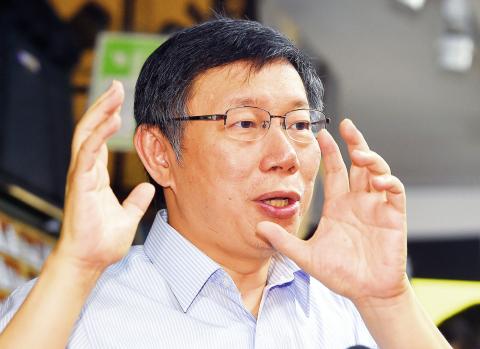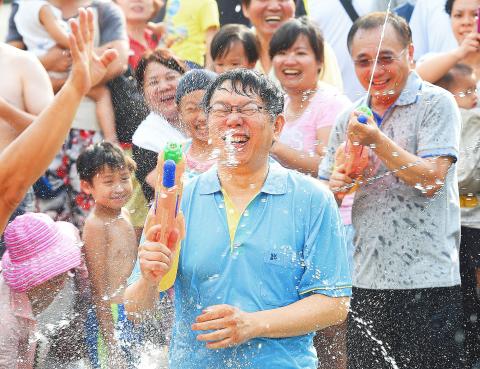Taipei Mayor Ko Wen-je (柯文哲) yesterday said he would attend a Taipei-Shanghai forum “if there is the opportunity” to do so, following media reports that negotiations between Taipei and Shanghai over this year’s summit had broken down.
“There will always be discussion and compromise over anything as important as this, so it would not be accurate to say that everything is going smoothly,” Ko said. “Instead, one should say that everything is still moving forward.”
The Chinese-language China Times reported that negotiations over the forum — which is held annually between the two city governments — were at a standstill for this year’s event after Ko rejected Shanghai’s demands to demonstrate greater “goodwill.”

Photo: Liao Chen-huei, Taipei Times
Ko said that the so-called “1992 consensus” — which Beijing insists must be the foundation of cross-strait talks — was the main issue of contention.
He said that he felt that “content” is more important than “labels,” adding that the Chinese Communist Party has historically been “pragmatic.”
The “1992 consensus” — a term former Mainland Affairs Council chairman Su Chi (蘇起) admitted making up in 2000 — refers to a supposed understanding between the Chinese Nationalist Party (KMT) and the Chinese government that both Taiwan and China acknowledge there is “one China,” with each side having its own interpretation of what “China” means.

Photo: Liao Chen-huei, Taipei Times
While Shanghai Mayor Yang Xiong (楊雄) said the forum can be continued only if the “1992 consensus” is used as a basis for talks, Ko has said his position is that cross-strait exchanges should respect the past “history of interactions” and be conducted based on the “present political foundation.”
Ko said that his “2015 viewpoint” was at least “tolerable” to both sides, adding that he was subject to pressure domestically as well as from China.
He added that the Taipei City Government hoped Shanghai’s leadership would visit Taipei in the near future for further negotiations, following visits by Taipei Deputy Mayor Chou Li-fang (周麗芳) to Shanghai and Xiamen last month.
Taipei Mainland Affairs Committee member Chiu Pei-lin (邱珮琳) said that no response to Shanghai’s demands was passed at last week’s committee meeting, because committee members were unsure what was meant by “goodwill.”
Committee member Chang Jung-feng (張榮豐) said that Shanghai had not defined “goodwill,” making it difficult to reply.
Chang said that the committee had discussed downgrading the summit so that deputy mayors could lead the delegations from each side.
Shanghai has not ruled out sending a representative to Taipei for further discussions, Chang added.
“We are not required to continue everything that was done by the [previous administration of the] KMT,” he said, adding that if the forum continued to take place, the Taipei City Government would take along a range of civil groups, in contrast to the previous city administration’s focus on corporations.
The annual forum, which was initiated in 2001 by civic groups as a channel for exchanges between the largest Taiwanese and Chinese cities, was organized at an official level in 2010 in Taipei for the first time.
Since then, the two cities have taken turns hosting the meetings.
Additional reporting by staff writer

Auckland rang in 2026 with a downtown fireworks display launched from New Zealand’s tallest structure, Sky Tower, making it the first major city to greet the new year at a celebration dampened by rain, while crowds in Taipei braved the elements to watch Taipei 101’s display. South Pacific countries are the first to bid farewell to 2025. Clocks struck midnight in Auckland, with a population of 1.7 million, 18 hours before the famous ball was to drop in New York’s Times Square. The five-minute display involved 3,500 fireworks launched from the 240m Sky Tower. Smaller community events were canceled across New Zealand’s

The Ministry of Foreign Affairs (MOFA) yesterday said it is closely monitoring developments in Venezuela, and would continue to cooperate with democratic allies and work together for regional and global security, stability, and prosperity. The remarks came after the US on Saturday launched a series of airstrikes in Venezuela and kidnapped Venezuelan President Nicolas Maduro, who was later flown to New York along with his wife. The pair face US charges related to drug trafficking and alleged cooperation with gangs designated as terrorist organizations. Maduro has denied the allegations. The ministry said that it is closely monitoring the political and economic situation

UNRELENTING: China attempted cyberattacks on Taiwan’s critical infrastructure 2.63 million times per day last year, up from 1.23 million in 2023, the NSB said China’s cyberarmy has long engaged in cyberattacks against Taiwan’s critical infrastructure, employing diverse and evolving tactics, the National Security Bureau (NSB) said yesterday, adding that cyberattacks on critical energy infrastructure last year increased 10-fold compared with the previous year. The NSB yesterday released a report titled Analysis on China’s Cyber Threats to Taiwan’s Critical Infrastructure in 2025, outlining the number of cyberattacks, major tactics and hacker groups. Taiwan’s national intelligence community identified a large number of cybersecurity incidents last year, the bureau said in a statement. China’s cyberarmy last year launched an average of 2.63 million intrusion attempts per day targeting Taiwan’s critical

‘SLICING METHOD’: In the event of a blockade, the China Coast Guard would intercept Taiwanese ships while its navy would seek to deter foreign intervention China’s military drills around Taiwan this week signaled potential strategies to cut the nation off from energy supplies and foreign military assistance, a US think tank report said. The Chinese People’s Liberation Army (PLA) conducted what it called “Justice Mission 2025” exercises from Monday to Tuesday in five maritime zones and airspace around Taiwan, calling them a warning to “Taiwanese independence” forces. In a report released on Wednesday, the Institute for the Study of War said the exercises effectively simulated blocking shipping routes to major port cities, including Kaohsiung, Keelung and Hualien. Taiwan would be highly vulnerable under such a blockade, because it